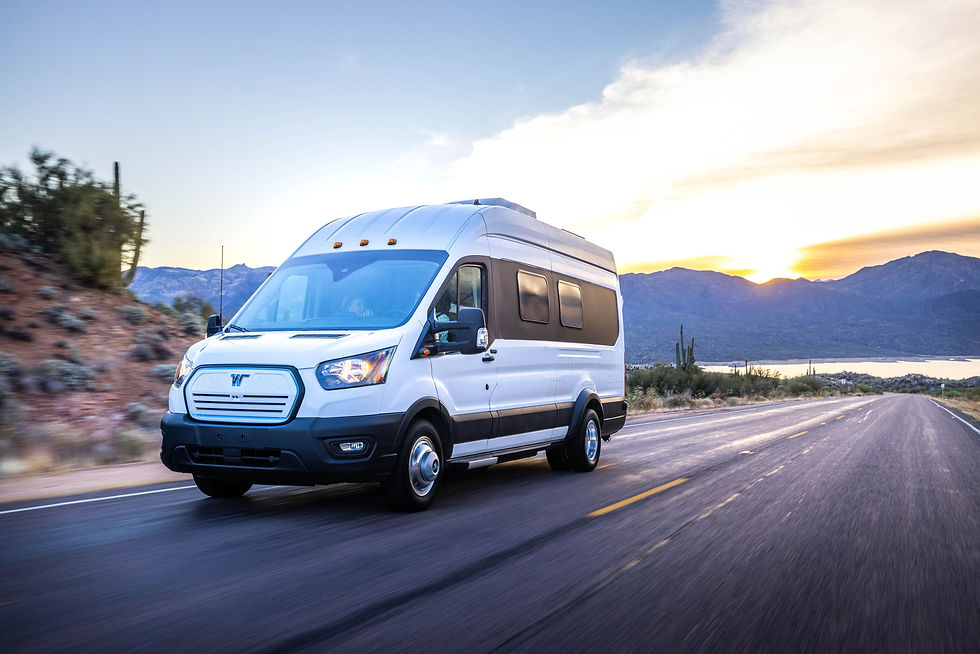Is an Electric RV Right for You? Pros, Cons, and Key Considerations
- Latch.it
- Mar 11, 2025
- 3 min read
As electric vehicle technology advances, the RV industry is also embracing innovation with fully electric motorhomes. But is an electric RV the right choice for your travel needs? In this guide, we'll explore the benefits, drawbacks, and key factors to consider when deciding whether to go electric with your RV.

What Are Fully Electric RVs?
Fully electric RVs run entirely on electricity, eliminating the need for gasoline or diesel. They feature battery-powered drivetrains, advanced energy management systems, and sustainable components that contribute to a greener way of traveling.
Comparing Traditional Gas/Diesel RVs vs. Full Electric RVs
Feature | Traditional Gas/Diesel RVs | Full Electric RVs |
Fuel Source | Gasoline or Diesel | Battery-Powered |
Environmental Impact | Higher emissions | Zero emissions |
Range per Charge/Tank | 300-600 miles | 100-300 miles |
Refueling Time | 5-10 minutes at any gas station | Several hours (depends on charging speed) |
More mechanical parts, higher upkeep | Fewer moving parts, lower maintenance costs | |
Power Source for Appliances | Propane or generator | Battery and solar power |
Availability of Refueling/Charging Stations | Widely available | Limited but expanding |
Cost | Lower initial cost, higher fuel expenses | Higher initial cost, lower operational expenses |
Towing Capacity | Higher towing capabilities | Limited towing capacity |
Notable Fully Electric RV Models
Winnebago eRV2: Winnebago has unveiled the eRV2, a fully operational, all-electric, zero-emission RV prototype. This vehicle represents the future of Winnebago RVs, aligning with consumers' desires for maximum comfort and convenience with less environmental impact. The eRV2 features multiple innovations beyond electrification, including technologies to simplify operation, multi-purpose interior design elements, and the use of sustainable materials throughout the interior. A fleet of eRV2 prototypes is currently undergoing rigorous field testing with everyday consumers to inform the vehicle's final design.
Grounded RV G2: Grounded RV has introduced the G2, an all-electric campervan built on GM's BrightDrop platform. The G2 boasts a fully loaded range of 250 miles from its 165 kWh vehicle battery, surpassing its predecessor, the G1. It comes equipped with features like Starlink internet and offers a modern, sustainable option for off-grid adventures.
THOR Vision Vehicle: THOR Industries has developed the THOR Vision Vehicle, a Class A motorhome powered by a high-voltage battery pack and an integrated fuel cell. This innovative power system, combined with enhanced solar capabilities, offers extended off-grid camping potential. The vehicle also includes digital tools to assist in various aspects of the electric RV experience, aiming for a best-in-class range of 300 miles.
Lightship L1: Lightship is pioneering all-electric travel trailers with their L1 model. Designed to be aerodynamic and equipped with an electric powertrain, the L1 reduces the energy consumption of the tow vehicle. It features an integrated solar roof and a battery system capable of powering the trailer's amenities for extended periods, making it a compelling option for eco-conscious travelers.
What are the pros and cons to consider?
Pros of Electric RVs
Eco-Friendly Travel – Zero tailpipe emissions contribute to a cleaner environment and reduced carbon footprint.
Lower Operating Costs – Charging an electric RV is often cheaper than refueling a gas or diesel counterpart.
Quiet and Smooth Ride – Without an internal combustion engine, electric RVs offer a quieter, more comfortable drive.
Reduced Maintenance – Fewer moving parts mean less wear and tear compared to traditional motorhomes.
Innovative Technology – Many electric RVs come equipped with state-of-the-art energy management, solar integration, and smart controls.
Cons of Electric RVs
Limited Range – Most electric RVs currently offer a shorter driving range per charge compared to gas or diesel models.
Charging Infrastructure – Finding charging stations for large electric RVs can be challenging, especially in remote locations.
Longer Refueling Times – Charging can take several hours, depending on battery capacity and charger type.
Higher Upfront Cost – Initial purchase prices for electric RVs are generally higher due to advanced battery technology.
Weight Considerations – Large battery packs add weight, which can impact storage capacity and towing ability.
Who Should Consider an Electric RV?
An electric RV may be a great choice if:
You plan to stay at RV parks or campgrounds with charging facilities.
You prefer short to mid-range trips rather than cross-country travel.
You value sustainability and reducing carbon emissions.
You are comfortable with the evolving electric vehicle infrastructure.
On the other hand, if you frequently travel long distances, camp in remote areas, or need quick refueling, a traditional gas or diesel RV might still be the better choice.
Final Thoughts
Electric RVs are an exciting step toward the future of sustainable travel. While they offer numerous benefits, potential drawbacks like range limitations and charging infrastructure should be carefully considered before making the switch. As battery technology improves, electric RVs will likely become a more viable option for a broader range of travelers.
Are you ready to embrace the electric RV lifestyle? Weigh the pros and cons, evaluate your travel needs, and make the best decision for your adventures on the road!
.png)




Great insights on electric RVs. It really helped clarify the pros and cons and whether this new tech suits different travel styles. On a completely different note, I’ve also been reading about Emma Stone Biography her journey is just as inspiring and full of fascinating career turns as choosing the right RV.
Trải nghiệm đẳng cấp cùng rr88, nhà cái tiên phong trong lĩnh vực giải trí trực tuyến, mang đến môi trường cá cược công bằng, bảo mật và chuyên nghiệp. Tại rr88.shopping người chơi có thể tận hưởng hàng ngàn trò chơi hấp dẫn như thể thao, slot, bắn cá và lô đề, với tỷ lệ thưởng cực cao. Nền tảng rr88 shopping còn được đánh giá cao nhờ giao diện thân thiện, tốc độ xử lý nhanh và các ưu đãi khủng liên tục dành cho thành viên mới lẫn cũ.
BET88 luôn là điểm đến được cộng đồng cược thủ tin chọn, nhờ hệ thống game phong phú và tỷ lệ kèo cực hấp dẫn. Dù đam mê thể thao, casino hay slot, anh em đều có thể cháy hết mình cùng BET 88 với tốc độ nạp rút thần tốc và dịch vụ hỗ trợ 24/7. Đặc biệt, bet88 gives trải nghiệm công bằng, minh bạch, mang đến cảm giác yên tâm trong từng pha xuống tiền của người chơi.
The project delivery is responsible for ensuring all the targets of building projects are achieved. Starting from planning, managing, and completing in which an appropriate training is necessary to be adhered to. Other than that, it is important to sharpen their capabilities to prevent any types of project difficulties that could affect the efficiency.
89BET mang đến nền tảng giải trí tối ưu cho mọi người chơi đam mê cá cược. Tại 89bet168 com, mọi giao dịch đều an toàn và minh bạch, trong khi các chương trình thưởng nóng được công bố liên tục tại https://89bet168.com/ giúp hành trình của bạn thêm phần thú vị.